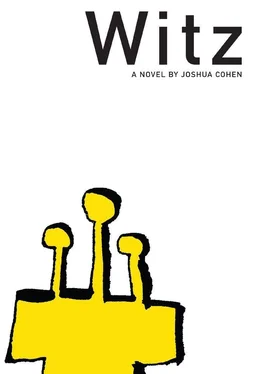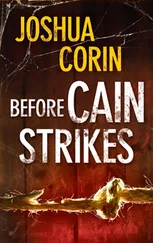Because this is what Was …how the world would create God as God had created the world, and then how humanity would create itself anew in the image of God in which it was originally created on the sixth day of In the beginning, upon which — now that it’s returned to us forever in the heart of the seventh — the nascent late sun would never dare set for fear of desecrating such Sabbath:
A world in which menschs, as if the season of spring lived within them, sprouted willowy sidelocks, and affixed knobby knotted strands to the fringes of their garments and covered their heads to assert modesty between their thoughts and the heavens that judge; their womenfolk went modestly garbed in dark raiment at the lengths of the ankle and elbow, and they, too, covered their heads and hair but in kerchiefs and wigs, which would tempt without revealing, which would promise without the flirt that fulfills. And maybe — a few scholars argue — this modesty’s to be attributed to the cut of the cold, yet another mode of insulation, remove, as the snow’d begun falling everywhere from Siberia where the snow had always fallen to the unprepared shorelines of what was then the Sodom of Florida, all along the Atlantic littoral from Newport’s Touro to Tampa piling up to the knee, to the waist then the neck depending on which blessing or prayer, whether one was bowing or kneeling, and even in parts known up to the seat of the head, which was covered in hats over yarmulkes above caftans below that would gust like dark ghosts in the wind. Eastern Parkway arose out of the skyline of Brooklyn as a ray of lighted ice, and everywhere had become if not the Pale of Settlement then only a slowbeaten fare away on the subway, which had gone out of service.
Though it wasn’t just the outside of our world that would become changed, not only the apparent, our world of appearances profane and profaning — we were to be changed from the insides, too, our stomachs, our hearts and minds, to be healed from our innards on out. All ate everything on their laden tables and in great measure and with an abundance of lust that left them warmed and wasted at the end of the day, with downy moustaches of oil and fingers that left on the finest of linen a script of interpretive grease. All ate everything, that is, save that that had become forbidden, which substance was shellfish, including the bearded oyster, the hoofed clam, and pork, which is the son of the pig, in addition to any meat whether red or white if ever served with milk or any dairy, and other sundry recipes of nature and woman they would memorize only in order to avoid and so avert the wrath of their intestines and God, Who to have been the image in which mensch was created must have Himself intestines, too, as our clouds are the black of His waste. Treyf products went out of stock, their manufacturers quietly disappeared, went underground, out of business, their bills got forwarded to dummy addresses and lockless P.O. Boxes, held at the office, general delivery, poste restante, then the foods themselves disappeared, were shamed, eventually starved themselves out to their deaths: their internal processes sped up, they wasted away, into nothingness shrinkwrapped, entire refrigerators with magnetized photos floating atop the surface of the deep and slipping, sliding around the moist face of the freezer, also, that judges above or alongside the model depending, sucked themselves into rot; appliances that’d been defiled even while under warranty withered and shrunk, then disappeared into the corners of the ceiling of the kitchen and became nothing more than mere stains on the rug in the den. And then their kinder, O their kinder — they sat at these laden tables of theirs and studied in the mornings then in the afternoons they attended yeshiva at which they were quick with an answer, even quicker with a question…like, Rabbi, what to study again at home and at table set unto the glimmering dawn of evening with the time of its prayer? which they prayed alongside their fathers with fervor and an understanding surpassed only by knowledge, such ardor of souls, then exhausted from their efforts how they’d bring with them the succor of their prayer into bed at night as if a gift of light to the moon, going to sleep as they were told to, when they were told to, without protest or fuss, to dream dreams that were actually themselves prayers that prayed for the sanctification of eternal tomorrows. Sanctiloquently. And everywhere was like this except the state known as Palestein, the firstborn nation of the world, conceived on the night before the first night of creation in the love between God and His bride, Who was God. Lo it was to be a resort state, yea an Eden of decadence, verily a garden of splurge — Paradise Herself for those who would gnash for a weekend or so at the plastic, inflatable tree of the secular and its many hundreds of neonnippled, fructified breasts; sustaining retirees, sunworshippers, and the anonymizing excess of tourists ingathered from repression the world over, who would number in the millions like the stars amid an atmosphere of darkening gloss: as there snow was unacknowledged if not outright forbidden by decree of the skies, and each of its thousands of luxury hotels hosting their millions of deluxe hotelrooms, all suites kitchensinked with jacuzzi, were kept tidy and well lit and ventilated, too, and were daily turned down with a sweet left at the head of the pillow fluffed for the delectation of our sunstruck, sleepsensual pilgrims returned from their days at the sea and its shore whose sand was as pale as the dead though the water, much warmer.
For them, the highest attainment lower than God Himself was culture, the practice of art, its appreciation, its love, which is inspiration, the life of the mind. And so prayers were thought with the hands then written down with the tongue and were bound up into piles known to us even now as books, which are heaps of words of letters of the unknown, which were widely read and even more enthusiastically discussed by all regardless of any condition save death, as twice every week and a third time upon the Sabbath they would flock not like dark sheep but like sheepish wolves to the marketplace, the synagogue, the risen Temple that is the perfected, sanctified, if also wholly metaphorical space that even if infinite can never contain the impulse of prayer, and there would read to each other aloud the words and the Word, too, in every language they understood and in any of them about God’s deeds, about each other and their deeds, and verily people would come to bind their wisdom between these two covers of parchment, between two of them like life and death, like air and like sea, the waters above and those below as stripped from the flesh of animals who are known to be the sworn enemies of art, then how they’d bring these books of theirs in vast teeming pilgrimages to the proverbial center of the world, only to pile them again in loose heaps every night arranged into the order most newly revealing by angels in glasses known to the assembled as Rose, Pearl, and Miss Sandy Glassman, Librarian; then, to erect a roof over this pile that was to be known as the sky and walls that were to be felt as the wind, and that within this enormity they had heaped atop the stone of the foundation of the earth, which is a petrified word, unutterable, rocky upon the tongue the last name of God that silences verb, they could all come and go as they pleased, and not just three days taxed a week or just on the Sabbath but whenever convenient, and there they could find out, they could know and even avail themselves of the opportunity to approach understanding. And in the annex of this universe known as America a mensch had arisen who was also named Benjamin, who had brought down to us the secret of glasses and that of the electricity that courses as blood through our veins — and verily he had once called such an institution a Library, and so it was and was so very good that walls of marble had to be erected within the wind, and then a roof, too, had to be set as firm as marble, there under the fundament of sky because so many people had wanted in and all of them at once needing their knowledge that it had become impossible to accommodate all.
Читать дальше












